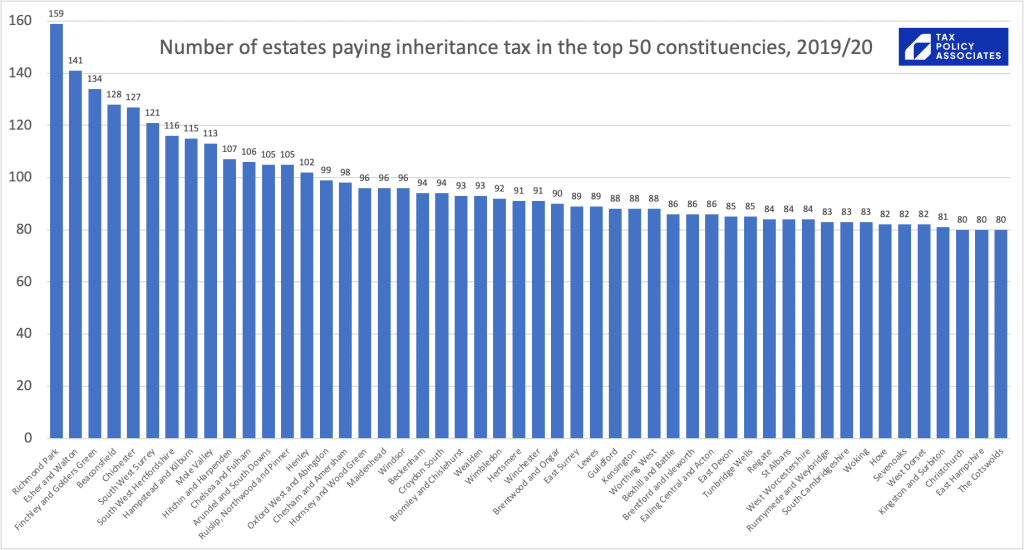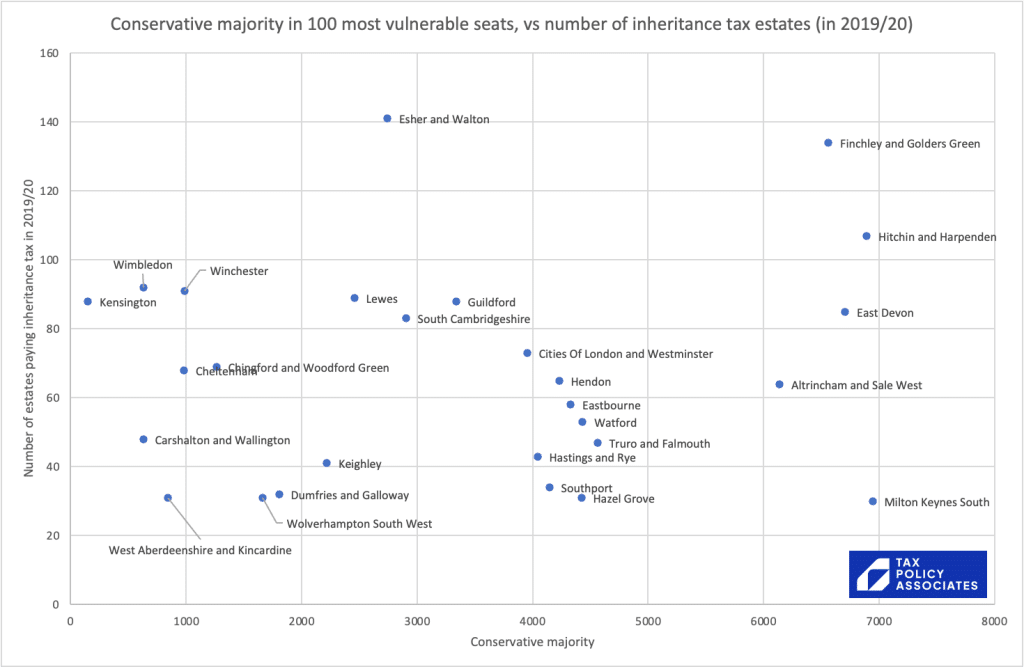Here’s an interactive map showing inheritance tax paid in each parliamentary constituency in 2019/20, and shaded by the number of estates paying inheritance tax. You should be able to zoom around with your mouse/fingers, and if you hover/touch a constituency you’ll see the data:
You can see a full-screen version here, one with alternate shading by the amount of IHT paid here, and the source code is here. Note that, for data privacy reasons, we see no data for any constituency where the number of estates is less than 30.
Another less pretty way to view this:

It’s easy to forget quite how few estates pay inheritance tax these days, given that most households will need £1m of net assets before they start paying the tax, and old age naturally depletes the assets we were saving in our life. Looking around to see how many households have £1m+ now is a poor guide to how many will end up paying inheritance tax (particularly given that many people will give assets to their children before they die).
So even in Richmond Park, only 159 estates paid inheritance tax.
And of course many of those that do pay inheritance tax will have a small bill. For example, if your estate has £1.5m of net assets, the inheritance tax is only on amount over the threshold/allowance – so an IHT bill of roughly £200,000.
(Note that the reason is absolutely not “the very rich don’t pay inheritance tax”. They do: they just pay a significantly lower effective rate than the merely comfortable off.)
So is there some political pattern in inheritance tax that makes it a big political draw? What if we look at the seats the Conservative Party has to hold to stay in power, say the 100 seats with the smallest Conservative majority? Many of those have less than 30 estates paying IHT, but of those with 30 or more:

No particular pattern, other than almost all of them have less than 100 estates paying inheritance tax (the Excel file is available here).
So, why does inheritance tax matter politically?
I’m not sure we know, but it won’t stop me guessing: it’s because of a widespread perception that the rich don’t pay the tax, but the merely comfortably off can be landed with large bills. (I think that’s consistent with this fascinating research from Demos).
That perception is basically true. Check out this chart, from HMRC, looking at the 2016/17 figures on what estates are actually paying in inheritance tax. There’s a spectacular drop-off in the effective rate for large estates (£9m+):

And look at what an outlier the UK is in international terms, with a relatively high rate but relatively low revenues:

There’s an obvious answer: we should fix inheritance tax so the green curve above is more flat, and the seriously wealthy pay the same effective rate as the merely reasonably wealthy. We should be able to do that by capping reliefs that are meant for small farms and small businesses, but end up providing a massive tax reduction for multi-millionaires. Then we can lower the rate to something more like 20% or 25%, without reducing revenues, and put the UK closer to The Netherlands, Denmark and Germany.
I think that would be the right thing to do, and treat both the seriously wealthy and the reasonably wealthy more fairly. I’ll leave others to judge how politically popular it would be.


6 responses to “Why does inheritance tax matter politically?”
Absolutely for a lower rate and an end to the exceptions. As you say, and your chart suggests, there are models out there that work.
For me I think it is likely more egregious than your numbers show. I suspect at the lower end of the large estates (that pay the highest rates of tax) the estate might well have been earned (i.e. taxed already) and have little experience of IHT planning whereas more of the very large estates (that pay a lower effective rate) might be more likely to have been inherited and hence untaxed.
Would you also need measures to stop estates moving offshore?
I think the stats shown for USA might need clarifying. As shown, maximum statutory rate is 0% and yet amount of IHT collected is more than 0. It is true that IHT (equivalent) at Federal level does not kick in until estates are approximately $11m but in many jurisdictions, state level estate tax kicks in at considerably lower levels $1m to $5m) and at rates up to 16%
Can’t the very rich simply use trust funds to avoid paying inheritance tax? The the Duke of Kensington seemingly did just that with the £9bn he inherited in 2016, or have the rules since changed?
I think that’s often misreported. Trusts pay 6% inheritance tax every ten years. So, over a lifetime, broadly similar to what normal IHT would be in practice. The issue is probably that much of the trust benefits from business property relief or agricultural property relief.
Trusts mostly aren’t useful tax planning for UK domiciled individuals these days.
“Inheritance Tax is a voluntary levy paid by those who distrust their heirs more than they dislike the Inland Revenue”
How does Belgium get such a high collection for its rate?
Is it just the reliefs you mention, that parents are less trusting, that they do something about lifetime transfers, or something else?
Replacing inheritance tax on the estate, with CGT on the receipt, with exemption beyond the general £6k only for spouses (so they are not forced to move out of their home) sweeps away all the problems.
Perhaps the Tories doing the former would enable Labour to do the latter!
Interesting article as always, but do you have the figures for the number of estates paying inheritance tax by constituency as a proportion of the total number of declared estates, the absolute numbers are less meaningful as they are.